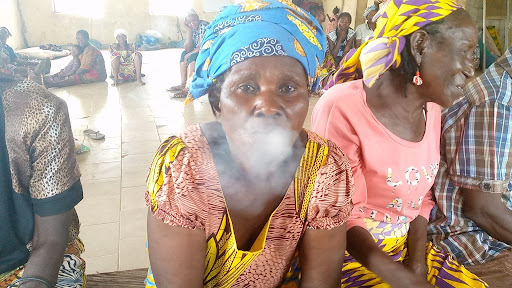Benue IDP Camp Where Women Smoke ‘To Stay Alive’
IDPs in Tse-Yandev camp in North-central Nigeria smoke after being exposed to a heavy downpour. It is the only way they feel they can forget their worries and, in some cases, ward off suicidal thoughts.

When it rains, the Internally Displaced Persons (IDPs) in Tse-Yandev, Benue State, North-central Nigeria, shiver in trepidation. Their tents can protect them from the sun but not the rain.
Gizan Toma, 84, sits in her tent, her eyes picking up objects around her. She is pale yet eager to light a stick of the cigarette pack in her hand. Her lighter fails to work because it was beaten by the rain. Instead, she waits for Vialumun, another woman in the camp, to bring her own lighter.
“I have been beaten by rain all through the night. Right now all my body aches and when it is like this, the only option is to smoke and feel warmth again. Smoking is beneficial at this moment because it also helps me stop thinking too much,” she says.
Perluve, 80, smokes because it helps her “not to think too much.” Until her forceful relocation to Tse-Yandev IDP camp, Perluve had never smoked.
“I used to be a good church goer in my village. I’m smoking because whenever I don’t smoke, I always think of suicide,” she explains. “While I was in the village, I was successful in the farm.”
An unfortunate story soon followed: “It happened in 2018, when four of my children were killed the same day while working on the farm. They were working when some armed men surrounded them and killed four of them at the spot. The armed men were later recognised as herders.”
“Since then, I have not been able to think straight. I wanted to go die with them but people wouldn’t let me.”
Mama Victoria Akumbu, 67, left Mbaguen in Guma Local Government Area after several attacks on the community.
“I, alongside my three children, were in the farm, when all of a sudden we heard gunshots. We thought they were hunters. Not until we saw people crying and running helter-skelter. To my surprise, five people were killed instantly, including my children. How I escaped, I still cannot say because they surrounded us.”
“This was in 2018, but as we speak the Fulani herders are still in the Mbaguen community till today. No one dares to go there.”
With her legs shaking and teeth chattering, Mama Akunbu hurriedly lights a wrapped local cigarette containing unprocessed tobacco. It is her third stick in thirty minutes.
“I feel light anytime I smoke. I smoke anytime there is no food just to feel good,” she tells HumAngle.
Health risk
BioMedCentral Public Health Reported that “Smoking is a leading cause of preventable deaths and morbidity, linked to high burden of lung cancer, chronic obstructive pulmonary disease (COPD), ischemic heart diseases and stroke. It accounts for more than seven million deaths annually with about 10% of these resulting from second-hand smoke. There are around 1.1 billion smokers worldwide and about 80% of these live in low and middle-income countries (LMICs), where more than two-thirds of smoking-related deaths occur.”
According to the 2003 World Health Organisation (WHO) Framework convention on Tobacco Control, Nigeria is the most populous country in Africa and has one of the leading tobacco markets in Africa, with over 18 billion cigarettes sold annually costing Nigerians over US$ 931 million. The WHO estimated about 13 million smokers in Nigeria in 2012, with over 16,000 deaths attributable to smoking. Increased commerce by international tobacco companies and the relative role they play in economic growth may have contributed to a rise in smoking rates.
So, IDPs in Tse-Yandev like Mama Akumbu, Perluve, Toma and several more, although finding succour in cigarettes, only add to the number of those endangering their health by smoking.
But this is the only survival they know for now.
Support Our Journalism
There are millions of ordinary people affected by conflict in Africa whose stories are missing in the mainstream media. HumAngle is determined to tell those challenging and under-reported stories, hoping that the people impacted by these conflicts will find the safety and security they deserve.
To ensure that we continue to provide public service coverage, we have a small favour to ask you. We want you to be part of our journalistic endeavour by contributing a token to us.
Your donation will further promote a robust, free, and independent media.
Donate HereStay Closer To The Stories That Matter




